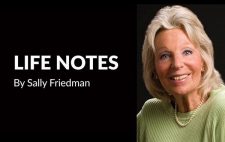Her name was Hinda, Americanized to Helen. A sweet, simple name. She was small but mighty, not formally educated, but smart as a whip.
When she was in her late teens or early 20s – no one is sure because birthdays in large Eastern European families were not marked with much hoopla – my mother-in-law set sail for a place called America. How much she had dreamed of this voyage, despite its rigors, despite her predictable fear of the unknown.
I met this little lady when I fell in love with her son, Victor. I was about the same age she had been when she arrived in a new country. But unlike Helen, I had been sheltered, protected, given modest luxuries and was about to graduate from a fine college. But our common denominator eclipsed all those differences. We both loved Vic.
Over the years that followed, I came to know Helen’s life story. Not in exquisite detail, but enough to understand what it meant to come to America. Just about everything.
She never talked much about the voyage that got her to Ellis Island, but years after her death, we were able to get the manifest – the passenger log – from the ship that brought her here. Steerage was where she slept. Not a very charming place, way down in the bowels of the ship. No fancy menus served to immigrants on their way to the Goldene Medina, the Golden Land.
She ended up, like so many immigrants, staying on the Lower East Side of Manhattan, where she met and married Jacob, a Russian immigrant and ornamental ironworker. She worked as a seamstress for a high fashion designer. It’s such a common tale from the era around the 1920s. Nothing unique about it.
But it was, I needed to remind myself, part of our heritage as a family. Not just for my husband but for our children and now their children.
My husband is a first-generation American. That gave him a special relationship to his country and culture. By the time he was born, Helen and Jacob had left New York for a small Central New Jersey farm. The Great Depression had forced them out of New York, where unemployment was rampant.
Vic’s immigrant parents still saw to it that their children would not have to live in fear because they were Jewish, the terrible plight they themselves had faced back in the old country. There are still gaps in what we know about Helen and Jacob’s early lives. There are missing parts because the memories were not sweet.
We know there were czars, not presidents, and that the sound of horses’ hooves was sometimes the signal that trouble was coming in their villages. So in a sense, their passage and passports to America became ours, too. I try so hard not to forget that when I whine about the minor inconveniences of modern American life, the small obstacles in our way.
We remind our grandchildren they share this heritage, even generations later. But it’s hard to convince kids who have indulgences unheard of by their paternal great-grandparents that they are truly blessed. Sometimes they listen. Other times, they (sigh) go back to their texting and after-school enrichment programs, their soccer travel teams and summer camps. How can they truly fathom the immigrant odyssey when they are so far removed from it?
How can they understand why there’s sometimes a catch in his voice when my husband – their grandfather – explains just how blessed we are to be here. Yes, this country often seems to be a mess. Sometimes, our national struggles seem epic. But oh my, how blessed we are that all those decades ago, Helen and Jacob Friedman came to this place called America.











